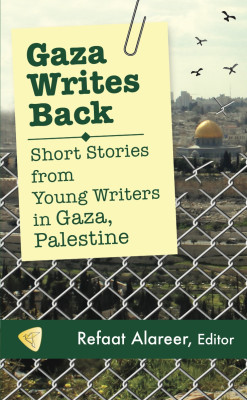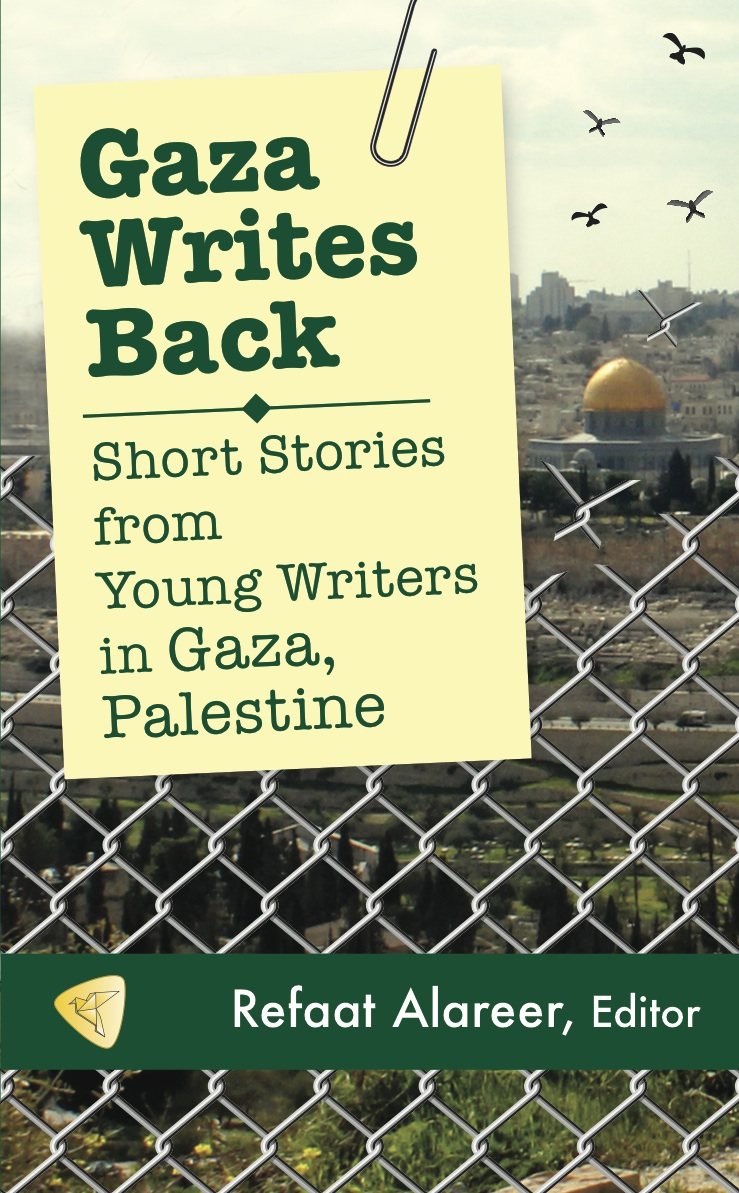28th December 2013 | Arabic Literature (in English), M. Lynx Qualey | Cairo, Egypt
It was five years ago that Cast Lead began. Now a book of short stories, Gaza Writes Back, marks the anniversary. The book’s editor, Refaat Alareer, answers questions about the collection:

Refaat Alareer: I’ve been teaching World Literature and Creative Writing at the Islamic University-Gaza (IUG), and at other Gaza training centres, ever since I finished my MA in Comparative Literature from UCL, UK in 2007. And I always had the idea of collecting the best pieces written by my students in a book. Going global became a necessity after the hateful Israeli Offensive of 2008-09. I met Helena Cobban in Gaza and threw the idea of a book of young talents into her lap, and later, thanks to Annie Robbins of Mondoweiss.net, Helena saw the potential in the project. In October 2012, Helena and I discussed a number of possible book projects and later decided a book of short fiction is the best place to start.
Since many of the writers are my own students (and friends), I contacted them and informed them of the idea of a book to mark the fifth anniversary of Cast Lead. We had a couple of fruitful workshops, and I took many of their suggestions into consideration. Later, I announced the project through Facebook, Twitter, local universities in Gaza, and personal contacts.
You should know that maybe only four stories were written in order to be submitted to the book. Many had already been written a year, two, or even three before I asked for submissions. But all pieces were written after the Cast Lead Operation.
I received tens of submissions (around 70!), and with the help of Sarah Ali, Sameeha Elwan, and Diana Ghazzawi, we managed, with difficulty, to narrow them down to 23 stories by 15 writers. Choosing the 23 stories was one of the toughest things I have ever done, because there were many more stories with strong potential.
AL: You say, in the introduction, that you wanted this collection to be “without the mediation or influences of translation or of non-Palestinian voices.” Why without translation? Are there particular effects of translation (on literature) that you’ve seen that you were trying to avoid?
RA: As much as I believe in the importance of translation, when it comes to literature I strongly believe many things get lost in translation, no matter how accurate. Therefore, our efforts were directed at improving the English creative writing skills. So that the writers think in English and express themselves in English. Also, the book comes to encourage and give a nudge to those who write in English, as that will enable them to write more and be in touch and in dialogue with the whole world. Maybe in the future we can work on a book of stories originally written in Arabic.
AL: Why young writers?
RA: Because they have a lot to say. Because they are doing most of the work these days. Because they are leading all the campaigns to make the world aware of the ills and pains Israeli occupation is bringing on Palestinians. Because young people have their worldviews and visions that are worthy of being heard. Because there are many more young Palestinians who write in English than old ones. And because the young have largely been marginalised from mainstream discussions.
AL: It’s interesting that so many of the young writers are women. Do you think this is particular to those who write in English?
RA: This is particular to those who write in English and in Arabic as well. In Palestine, we have more women joining universities than men, more women journalists than men, more women activists than men. Women are in many ways taking the lead, in writing, in activism, and in struggle.
AL: You quoted Sameeha Elwan, in the introduction, in saying that the Internet has changed the storytelling process among Palestinians (who have been fragmented since ’48). Will this collection somehow make use of the Internet? Will any of the stories appear online?
RA: Much of the support for the young writers came through the internet. They first started by posting their creative pieces in forums, and personal blogs, and Facebook, and then Mondoweiss, the Electronic Intifada, the Palestine Chronicle and other websites. The encouragement the writers received from people in Palestine and all over the world was a catalyst for more writing. That means without the internet, many of the pieces could have been forgotten or not written in the first place. Social media platforms have been the major battlefields in the recent years. Facebook pages, YouTube Videos, and Twitterstorms have brought awareness about the Israeli occupation and human rights violation and about the suffering of Palestinians in Jerusalem, Gaza, areas occupied in 1948 and the West Bank. Currently, we are very much depending on social media to promote the book and raise awareness about Palestine.
I think with permission from the publisher, certain extracts from the stories can appear online (some already did).
But other than that, we hope that some of the pieces can be made into films or short videos.
AL: One of the PalFest authors, who has taught workshops in both Gaza (by video link) and the West Bank, has said that — because of life, and life-and-death issues — it’s generally been difficult for talented young authors to follow through on writing projects. Do you find that’s true of young authors in Gaza?
RA: To some extent, when it comes to online courses or tutoring, it’s true. Imagine yourself not having electricity for most of the day! However, in the many courses I held in Gaza, there were a lot who joined and benefited from the creative writing sessions such as short story writing, poetry writing, and general creative-writing skills.
Israel is making it very difficult for Palestinians to live a decent life. Israel has caused every possible hindrance to prevent Palestinians from being. Still, that very same thing was the very cause that led many to write back. For many of us, writing is an act of resistance, but it is also an act of life, meaning writing happens no matter who we are and where we are. We write, therefore we exist.
AL: Most of the selections are very short. Some of them are powerful snapshots — the pain and embarrassment in Sameeha Elwan’s “Toothache in Gaza” and Muhammad Suliman’s “Bundles” — but they’re more like “flash fiction” than short stories. Did you ask for very-short pieces, or is this how the writers turned in their work?
RA: When the book was announced, I asked for “short stories/short fiction stories.” No word limit was imposed. The micro-stories, in my opinion, suit the atmosphere they came to life in and reflect many aspects of Palestinian life. The stories, by zooming so closely into a very precise moment, show how brief life, hope, and dreams under occupation can be. Even the abruptness that characterises some of the pieces tells of a promising story suddenly coming to an end because the main character is killed. Because of Israel. Because there is occupation. It is true many of the stories begin in medias res, but at the end no resolution is made, as the suffering, the pain, and the deprivation continue to linger, haunting readers for a long time after reading the story. In other words, the story still ends in medias res.
Writing longer pieces is something I started working on with a couple of the writers. Although this might require a lot of time, effort, and training, some told me that the idea of writing longer stories, even novels, is lurking in their minds. Hopefully, the attention of this anthology will receive will encourage them to write more and write longer pieces.
AL: What comes after Gaza Writes Back?
RA: I am hoping the stories will get the attention of film producers. I know at least a couple of the stories can be made into great movies, or at least short movies.
Helena Cobban and I have several plans for other book projects to follow. The focus will also be to bring young voices to forefront. At the same time we will work on translating the book into Arabic, French, Spanish, Malay, among other languages.

